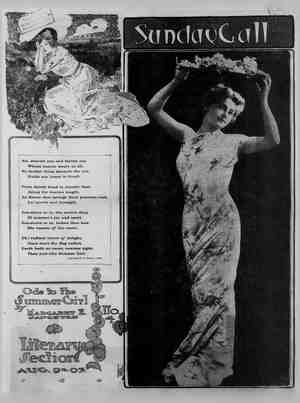Omaha Daily Bee Newspaper, August 9, 1903, Page 24
You have reached the hourly page view limit. Unlock higher limit to our entire archive!
Subscribers enjoy higher page view limit, downloads, and exclusive features.
Omaha Trade Excursionists in Western Iowa SOUTH Photographs Made for ON BTEAMER AT WALL LAKE, Where the Whole Family Goes to War HEN the rat-a-tat-tat of the drum calls patriotic citizens to arms in the United States and other highly civilized countries, the girls are left behind, Husbands and fathers, swecthearts and brothers, g» to the front; and the women and children have nothing to do but walt and weap. It Is not so everywhere. In Veneczuela, Colombia, Hayti, Domingo, Boliv Nicaragua and some of the other 1 s: vanced Latin-American countries, the tire family sometimes goes to war It happens this way. One of the ecivl wars, which are the normal featares of politics In these countries, is In and there Is an urgent San en- [rogress, demand for troops by government and revolulion!sts al ke Both sides stick at nothing in order to get soldiers. They are not particular. Any- body who can carry a2 gun—man, woman or boy—will do. A group of half-civilized Indians are tiil Ing their figids or listening to a Jesu't priest in a little misson church in the heare of the jungle. A band of soldiors comes along, surrounds them and marches them all off to fight for a cause about which they know and care absolutely nothing “But my wife, my bays, senor!"” wuils the peon to the commandante, whe has cap- tured him. *“What is to become of them?" The family troops up, weeping and shrieking and begs the officer to let the man go. The officer looks at them thought- fully and sees that the boys are strapping lads of 12 and 14, and that the wife is a fine, strong woman, “No, 1 must take your man,” he tells her, “put, if you like, you and the boys can come, too. They are sitrong enough to march and carry ritles and you can help do the cooking for us and look after the wounded." So it comes about that the entire family marches off to the front, happy and cheenr ful again. - They make light of the hazard of war and the hardships of the cam- paign. There are no hardier pecople in the world than the Indians of Central Amer- fca, Colombia and Venezuela. Even the women think nothing of marching thirty miles a day for weeks at a stretch over rough., mountain tracks, carrying a rifle, a he cartridge belt, a machete and a pack-load of miscellaneous baggage Sometimes a guerilly band will enlist all the members of a family, from the young- est boy of 10 to the grandfather of 70. And they will march and fight gide by side—husband and wifej mother and daughter, father and son, uncles, aunts, cousins and grandparents, During the recent civil war ln Colombia, The Bee by J. M. Guild » 5 s < e B - v B fif“1y:\ B Tl el when the government was very hard pressed for troops, it was a common prac- tice to surround country churches on Sun- day and forcibly enlist the entire congre- gation, except old people and infants un- able to march. The armles with which President Castro has made his great fight against the revolutionists in Venezuela comprise a large proportion of mere boys, whose ages range as low as 8§ and 9, and every com- pany of his soldiers has from a dozen to twenty women attached to It They are generally Indians or mulattos, and they march with the baggage train, armed to the teeth, when the troops are campaign- ing. Such women always accompany ezeulan or Colombian armgy and make the troops with rum while fire, stealing provistons for thelr blvouac, and tending the wounded. On occaslons, too, they will take their place in the firing Matos a Ven- field, supplying are under into themselves usefu! by the they line and fight as bravely as any man on the field. Wi I was in Caracas last January Cas- tro's army marched home in triumph after defeating the revolutionists a few days before Chrisimas There was a blare of trumpets, a dis- cordant rattle of kettle-droms, an eare ICIAL QUARTE J. 1L Den plercing shiek from the fifes and the army swung round the corner and marched up the street past my hotel. First came the fife and bugle band, com- posed of half a dozen ragged Indian boys, blowing a triumphal march for all they were worth. Behind them, riding proudly on a stolen mule, a copper-colored general carried a huge Venezuelan flag, its gaudy strips of red, blue and yellow flaunting proudly in the sunlight. He was dresged In a palr of tattered red “pants,” with a broad gold stripe, a blue service blouse like that of the United States army, an old palm-leaf hat with ribbon of the Venezuelan colors twisted round it, and a pair of alpargattas—the native canvas sandal, which exposes the toes and heels. A M er rifle was slung over his shoulder, an Andino machete with a gally colored scabbard hung on one side and a brass-hilted regulation sword on the other, while (he belt around his waist contained a heavy Smith & Wesson revolver and emough cartridges for a Maxim gun, The army followed in single file, generals and colonels marching along on the flanks in generous profusion. There was a field officer to every half dozen men, but yom could hardiy tell the field officers from the rank and file. It would be impossible te (Continued on Fifteenth Page) .


